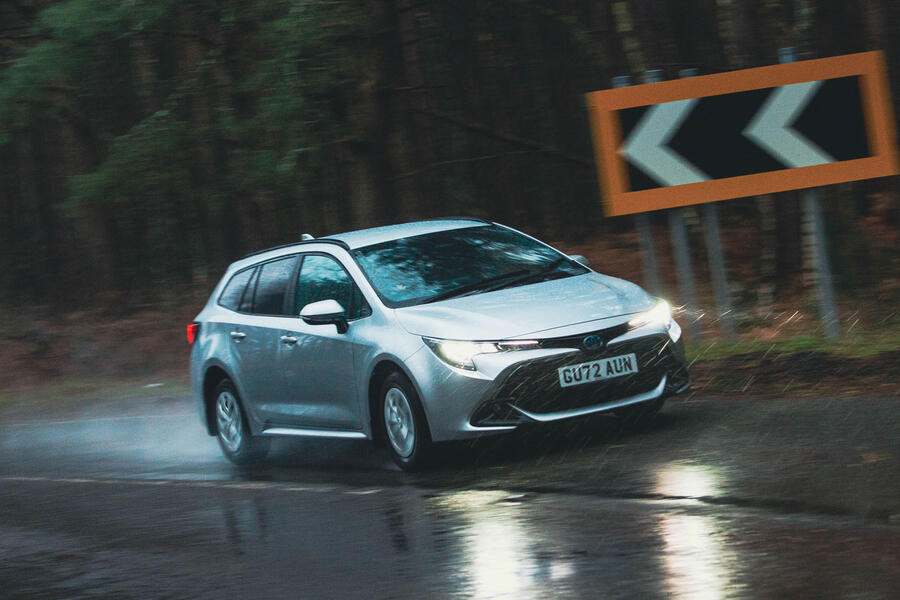The UK government’s ZEV mandate is “a very big challenge” and could affect the viability of the whole automotive industry, Toyota Europe president and CEO Yoshihiro Nakata has told Autocar.
Nakata, speaking at Goodwood’s Festival of Speed, said he believes only co-ordinated action by car companies, and “constructive communication” with law makers, can create workable solutions to hit the challenging targets.
These state that EV sales must be at least 22% (in 2024, rising each year) of a car maker’s overall volumes, or fines of £15,000 per non-compliant vehicle are dished out.
Nakata acknowledged that Toyota’s current position of having just one pure EV in its range (the bZ4x) is a concern but insists Toyota will have a range of EVs “to provide customer choice” when necessary.
For now, however, Nakata believes Toyota’s heavy concentration on selling pure and plug-in hybrids continues to make an effective contribution to the universally acknowledged target of reducing CO2 levels by as much as possible, as soon as possible.
“We never forget that real customer demand is the basis for what we do,” he says, hinting that hybrid models, rather than EVs, is what buyers want.

This notion is backed by the brand’s new pact with Japanese allies Mazda and Subaru to “optimise” combustion engines with more efficient electric motors and batteries and a push to use alternative fuels.
The trio said the decision to not fully focus on EVs was driven by “a deep understanding of their customers’ diverse lifestyles” as well as a belief in a future for ICE.
Despite this, and coupled with Toyota’s current range-of-one EV line-up, UK boss Scott Thompson, appointed MD and president of Toyota GB last January, has confirmed the company is on track to hit ZEV mandate targets this year.
Thompson declined to provide detail of next year’s strategy but insists he already has a workable plan and he feels “extremely confident about Toyota’s multi-path philosophy” for the future. The company is reported to be planning the launch of five new EVs by 2026, including the Urban Crossover, which has already been revealed in concept form.
Meanwhile, Nakata neatly avoided opportunities to support or criticise the EU’s decision to increase import tariffs to as much as 37.6% on Chinese-built EVs (a move likely to be echoed by the incoming UK government, but not yet confirmed) but he agrees that, for the time being, the move will “provide a following wind for us”.







Join the debate
Add your comment
This challenge has been caused by Toyota not investing in battery electric vehicles (BEVs), which they should have been doing since 2010. If they suffer any hardships because of this, it's their own fault. Even though Sunak tried to protect his mates in the fossil fuel industry, you can't hold back progress. If Toyota don't build BEVs, someone else will get the sales.
Well at least Toyota aren't continually whingeing, asking for tax payers money and threatening to leave the country like Stellantis seem to be doing all the time now.
The UK ZEV mandate (now apparently brought back to 2030 by Labour - who'd have thought!) is both pointless and hugely damaging. Overall car emissions are already 90% lower than 1990 and NOX targets were reached over 2 years ago. It's an insane madate that will hugely damage car makers, eliminate consumer choice but increase costs and make no difference whatsoever to the climiate. We're on a road to destruction as more and more minerals are ripped from the earth, but virtue-signalling politcians will be patting themselves on the back. It must be stopped!
The UK EV mandate was set by conservatives (Boris) and was not inpacted by Sunak's much discussed but useless grandstanding. Between now and 2030 the sale of EV's is to rise to 80% of cars sold have to be EV's by 2030. All that Sunak did was take the 20%, which were set to be hybrid and say that 20% can be made up of hybrid or ICE vehicles. That was a sheer slight of hand by the then Conservative PM. This situation was planned by the Conservative government that carried on their normal policy of do nothing and infight rather than ghet on a do things. Not a great fan of Labour but so far they have been more grown up.
You are correct, we need to stop extracting materials from the earth and reduce the number of combustion engined cars with the tons of materials and horrendous energy efficiency of around 15% propulsion energy from the oils extracted. Time to stop buring fossil fuels. Toyota stuck their head in the sand and stand to get burnt in China and Europe.
Well lets see if Sir Flip Flop goes back on his pre election mandate to ban pure ICE cars in 2030. I reckon it'll be Labour's first broken promise.
Hybrids and EV's are fairly well established, why would you need a non-hybrid ICE vehicle? Just phase out non-hybrids in the next 6 years then phase out hybrids over the following 5 years. That would not be difficult. Diesel car sales fell from 746K to 83K 2018 to 2022, we could cut that to 0 now and few would notice. Do the same with pure ICE car sales over the time to 2030. It just takes a government that lasts longer that 1 year without the next one contradicting itself like the flip Flop conservative party.
Get a grip @xxxx. ICE cars are not being banned in 2030. Only the sales of new models. You can keep driving your toxic diesel lung-sludger for as long as you like.
@tman247The vast majority of the "minerals being ripped from the earth" are fossil fuels. That's what is causing the damage. Plus none of those fossil fuels can be recycled, unlike batteries. So if you want to complain about something, complain about the people working at oil companies, they are the real villains. (Unless you are one of them, as I suspect?)